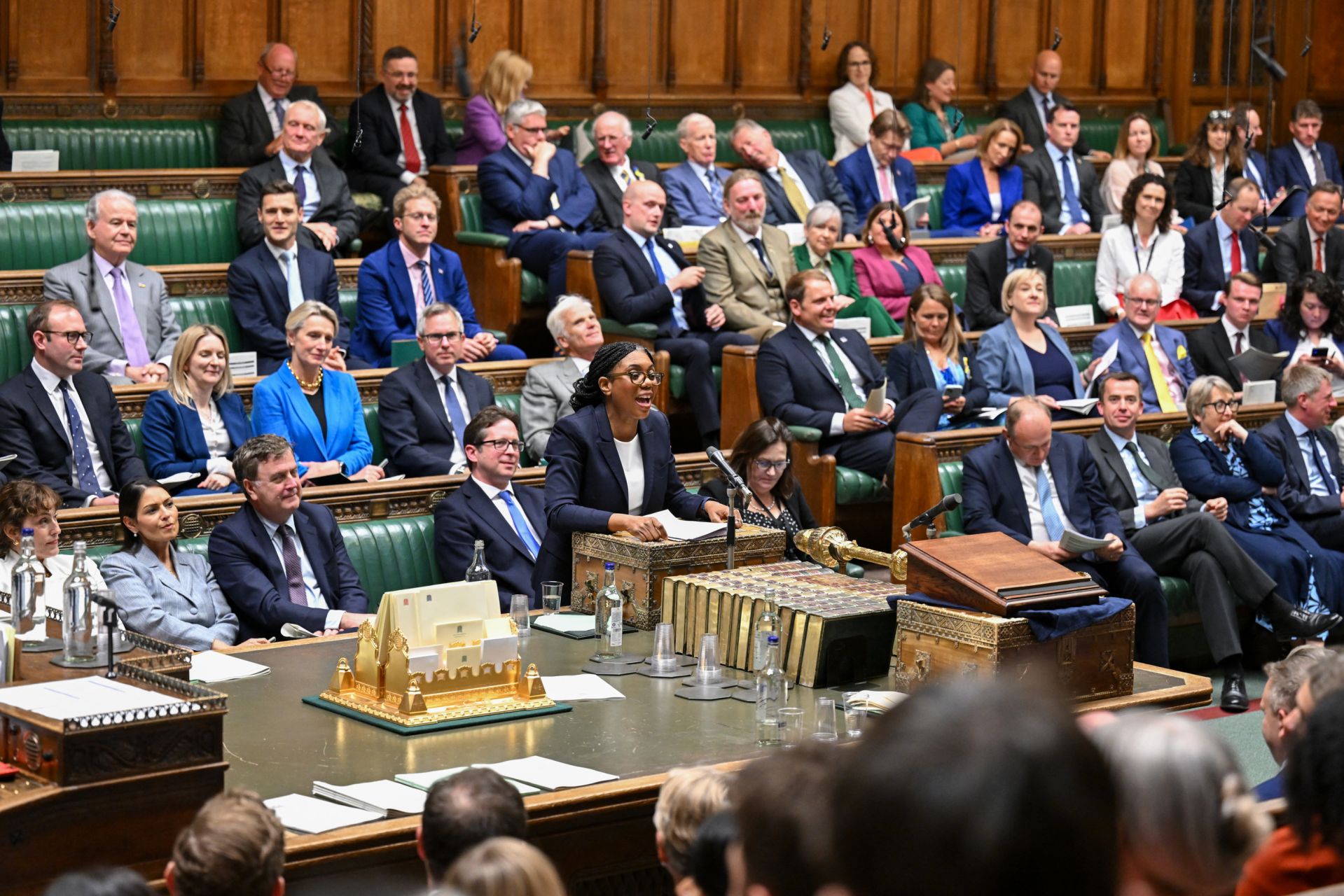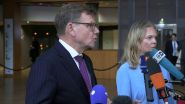- Home
- Middle East
- UK, EU Hail new Partnership deal, but Questions Remain

A handout photograph released by the UK Parliament shows Britain's main opposition Conservative Party leader Kemi Badenoch speaking to MPs during Britain's Prime Minister Keir Starmer statement about the partnership agreement signed the European Union during the EU and UK summit, in the House of Commons, in London, on May 20, 2025. ©House of Commons / AFP
Britain has hailed Monday's strategic partnership agreement with the European Union as the start of a new era, but the effects of the deal on defense and trade remain unclear.
Will the agreement boost UK economic growth?
That is one of Prime Minister Keir Starmer's key arguments for restoring closer ties with the EU.
This deal, along with those signed earlier in May with the United States and India, "release us from the tired arguments of the past and, as an independent sovereign nation, allow us to seize the opportunities of the future", the Labour leader told parliament on Tuesday.
The 2021 post-Brexit Trade and Cooperation Agreement did not reinstate tariffs between the UK and EU, but introduced new trade barriers.
The easing of veterinary checks and rules on food and drink trade, agreed on Monday, could increase UK exports to the EU by more than 22 percent, according to a study by the universities of Bristol and Aston.
The deal also exempts UK businesses from the EU's carbon border tax -- saving more than £800 million ($1.07 billion) a year, according to Starmer's office.
Industry body UK Steel called it "a significant step in reducing trade frictions in steel with the EU".
The UK government expects estimated economic gains of "nearly £9 billion" by 2040 -- but that amounts to less than 0.3 percent of the country's GDP.
Could the defense pact shift the landscape?
London and Brussels signed a pact to deepen defence cooperation, aimed at strengthening dialogue.
The stakes are high given Russia's threat to European security, cyber dangers and concerns that the United States is disengaging from Europe.
But Ed Arnold of the UK defense think tank RUSI said the agreement sets out "no tangible deliverables or milestones, instead relying on vague commitments to talk more".
"To 'consider' participation is not a commitment to deploy, and as such does not compromise government sovereignty in any way," he said.
"The real meat, the question of UK participation in defense industrial cooperation, is left still to be done," said Ian Bond, deputy director at the Centre for European Reform.
"That's not a surprise but this is an indication that there is still a lot of work," he added.
Does the deal mean a loss of UK sovereignty?
Conservatives and the Eurosceptic Reform UK party accused the government of handing over sovereignty to the EU.
Opposition leader Kemi Badenoch on Tuesday described the deal as a "betrayal" and a "failure".
The Sun tabloid accused Starmer of agreeing to adopt Brussels' rules, "bow down to EU judges" and criticised its agreement to allow French boats to continue fishing in UK waters for another 12 years.
On sanitary and phytosanitary standards, the UK will have to align with EU regulations and adapt to future changes. Any disputes will ultimately be settled by the European Court of Justice.
The UK will have little influence over future rules affecting its own territory, said Tom Bradshaw, president of the main farming union NFU.
"Despite the benefits this deal brings, full dynamic (regulatory) alignment comes at a significant cost of committing to future EU rules, in which the UK will have little say," he said.
While London conceded more than expected on fisheries -- extending EU access to British waters due to expire next year for 12 years until June 2038 -- the sector accounts for just 0.03 percent of UK GDP.
British fishers already export three-quarters of their catch to the EU, and the standards agreement will be "hugely beneficial", said Bond.
What comes next?
Several issues remained unresolved after Monday's summit, including an EU-backed youth mobility scheme and the UK's potential return to the Erasmus student exchange programme -- both priorities for Brussels.
London, for its part, is seeking relaxed visa rules for touring artists and mutual recognition of professional qualifications.
The two sides agreed to hold a bilateral summit every year.
Some observers see the outlines of a relationship similar to Switzerland's, based on multiple bilateral agreements with the EU.
The idea, particularly on mobility, is to strike specific arrangements in areas where the EU also sees a mutual benefit, said Bond.
By Marie HEUCLIN/AFP
Read more



Comments